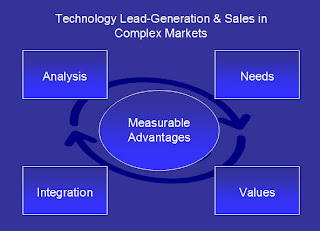
I was asked a generic question yesterday ... this was my response.
Let me first tell you a quick story - a talented female professional I know was once invited on a skiing trip with some folks she hoped to do business with. Although she didn't know how to ski she figured she could learn by just reading a book on the drive there, so she went along! As you may guess the results were funny and memorable but didn't work out as well as she hoped.
My main point - there are business practices that can be defined by text but, just like learning to ski, they need some trained coaching if you are serious about beginning to use them.
Effective modern lead-generation has four dynamic, interconnected elements:
1. Needs. Before you make any communications (cold calls, brochures, emails etc.) with potential clients make sure you have a clear understanding of what Customers Need. Traditionally Marketing and Sales teams do not work particularly well together. An estimate from AMA (American Marketing Association) literature suggests that 80-90% of marketing messages are not re-used by sales processes. This is because the marketing team is attempting to communicate a critical message to a broad audience from 35,000 feet while the sales team's efforts are always at 3.5 feet. The best sales' communications deal with the client's Needs rather than just highly publicized features of the product or service.

2. Value. Make sure to have examples, case studies, spreadsheets that validate the values produced by your offering. No matter whom you communicate with they will want to make sure that your product or service can both solve their problem but also produce a business advantage.
3. Integrated Application. Modern lead generation is a multi channel process (a lot like snow skiing!) No matter how great your first cold call the next step for the client will be to search for your website. Are the messages you just delivered, that solve specific business needs for the client, the same as the web pages? Do your white papers, press releases confirm the values you suggested? Have you a SEO strategy in place? Above are there internal resources (e.g call scripts) that are used as the primary messaging processes by all team members, from raw leads through sales, proposals etc.
4. Analysis & Feedback. It's a team sport and you are the coach! Suppose you generate many leads but it takes the sales team days or weeks to follow-up. How often are the leads you've generated not so great? What improvements can be made to filter out these potentially weak opportunities and make the overall process more effective?
The consciously well-coached process I have just described will improve effective lead-generation by a factor of 10. Traditional approaches to lead-generation are like attempting to learn to ski from a cheap book! If you want leading business results be prepared for real training and coaching.
"The Future"


